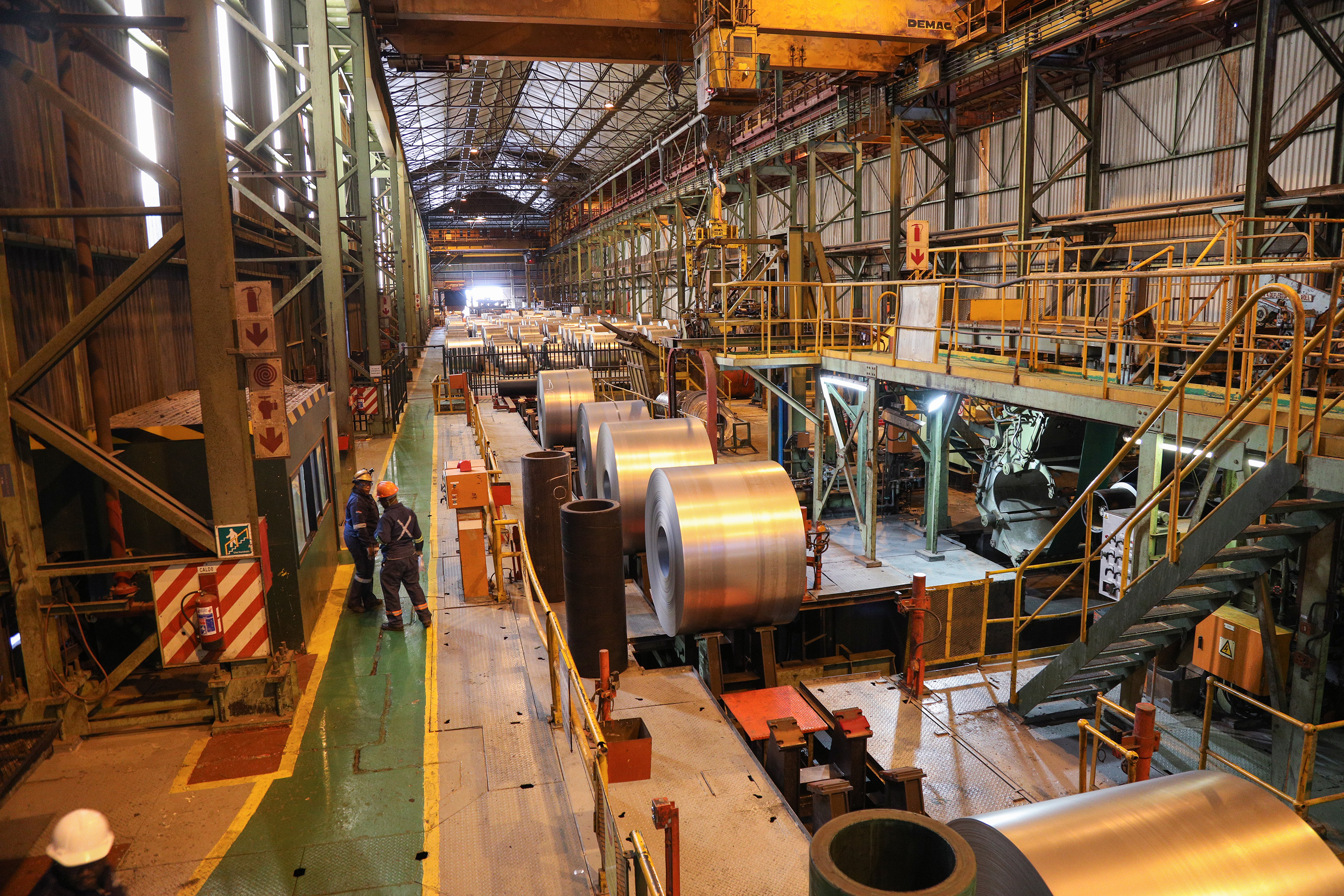There goes South Africa’s ambition of reversing the long-established deindustrialisation trend.
ArcelorMittal South Africa’s announcement this week that it will shut its loss-making long steel operations in Newcastle and Vereeniging is another death knell for the country’s plans of reviving manufacturing capabilities.
The “made in South Africa” or “local is lekker” phrases — often trumpeted by government officials — are likely to remain platitudes until policymakers become serious about rebalancing the economy towards manufacturing things once again.
ArcelorMittal pulling the plug on its steel operations is devastating.
The closures will result in an estimated loss of 3,500 direct and contractor jobs in provinces across Gauteng, Mpumalanga and KwaZulu-Natal. When ArcelorMittal’s steel operations cease to operate at the end of January, South Africa will lose an estimated one million tonnes of annual long steel production. Long(s) refers to a range of steel products used in key sectors, such as rail, agriculture and mining, and is critical in power transmission.
ArcelorMittal’s decision has broader economic consequences. It’s more evidence of South Africa’s sorry deindustrialisation story, which has played out for 50 years but has become more pronounced over the past 20 years.
Deindustralisation happens when a country reduces or stops manufacturing things at a rapid rate, and shifts its focus to other sectors of the economy, like business services, retail, or technology. In other words, it is when investment and employment-intensive industries count for less than services in the economy.
In South Africa’s case, deindustrialisation has been happening at an alarming scale — as seen in manufacturing activity being in secular decline and contributing far less to the country’s economic output, and employment.
Sometimes words don’t have an impact, or capture the enormity of a crisis. However, images do. The charts below, compiled by the excellent Ann Bernstein, executive director at the Centre for Development and Enterprise (CDE), capture South Africa’s deindustrialisation crisis.

To explain the charts, the one on the left shows that the manufacturing industry’s contribution to economic output (or GDP) has halved from a peak of 25% during the 1980s to 12.9% by 2023. The chart on the right indicates that employment in the manufacturing industry has also declined — from 1.8 million in 2007 to less than 1.6 million in 2023. That’s a loss of a lot of good blue-collar jobs, which has probably increased inequality and unemployment levels in the country, and scuppered the opportunity for people to upskill in industrial production.
In South Africa’s defence, de-industrialisation is not unique to the country, but has been a global phenomenon.
At its peak, manufacturing made up nearly half of the UK’s output and employment, but now it’s under 10%. In the US, it peaked at 28% in the 1950s and has since dropped to around 10%. Even in Germany, Europe’s manufacturing leader, manufacturing’s contribution to output and employment fell from 25% to 19% between 1991 and 2022.
The declines have been driven by the relocation of manufacturing production from west to east, the global economy opening up and the liberalisation of trade, with many countries embracing goods from China.
Unlike South Africa, developed countries have been proactive and innovative in their response to the perennial decline of manufacturing.
First, the US, UK, and Germany have embraced new industries and manufacturing capabilities. The race to decarbonise has pushed countries to green technologies and industries including solar and battery storage.
Second, the disruption of Covid lockdowns on global supply chains pushed developed countries to focus on onshore manufacturing, which involves the production and sourcing of goods within the country in which they are sold.
Third and perhaps a more pernicious factor is that governments have been spending a lot of money on arms and defence capabilities as geopolitical tensions heightened, with the war in Ukraine and other parts of the world. This has boosted the arms manufacturing industry.
Instead of being innovative and finding new sources of manufacturing, South Africa’s government focused on implementing measures to protect the manufacturing industry and its players.
A protectionist approach stalked policymaking, according to a recently released report by the CDE titled Rethink growth, jobs and the DTIC (Department of Trade, Industry and Competition).
The government upped the ante on Broad-Based Black Economic Empowerment requirements, preferential procurement arrangements (government agencies buying goods predominantly from domestic firms); increasingly used its powers to intervene in mergers and acquisitions (especially deals involving foreign entities that would be forced to not retrench workers and procure goods from local companies), and implemented many tariffs/duties on imports. Since 2003, 94 tariff codes that attract an import duty have been increased.
The Centre for Development and Enterprise believes that most of these policies have been harmful instead of helpful as they added compliance costs for manufacturers, created uncertainties and discouraged investments.
Then there is the dysfunction of Eskom (blackouts) and Transnet (poor rail and port performance), which harmed the ability of manufacturers to produce goods and export them to markets.
Manufacturing in South Africa requires a new approach to policymaking. Good industrial policy is needed, which will involve incentives from the government for research, design and innovation, lowering energy and transport costs, creating pathways for investing in education and job training for a 21st-century economy, promoting access to cheaper capital for manufacturers to scale up, and helping manufacturers to sell their goods to other countries.
Otherwise, more manufacturers will face a fate similar to ArcelorMittal’s.
Good investing. DM
Business Maverick
After the Bell: ArcelorMittal woes add to SA’s alarming deindustrialisation





